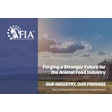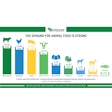At the National Ethanol Conference in San Diego, Geoff Cooper, president and CEO of the Renewable Fuels Association (RFA), declared 2024 as a crucial year for the ethanol industry, potentially shaping its trajectory for years, if not decades. Addressing nearly 1,000 attendees, Cooper highlighted several upcoming policy decisions that will significantly impact the industry.
Cooper focused on the Inflation Reduction Act’s sustainable aviation fuel (SAF) and clean fuel production tax credits, year-round E15 availability, and new light-duty vehicle tailpipe greenhouse gas (GHG) standards as key factors influencing the future of ethanol. He emphasized the importance of using the latest science and data to determine the carbon intensity of fuels for IRA tax credits, including a variety of carbon reduction strategies.
The impending Biden administration’s SAF carbon footprint model was another focus of Cooper’s speech. He stressed that this model will be decisive in determining whether U.S. agriculture and ethanol producers can actively participate in the SAF market or be excluded due to reliance on high-volume, low-cost feedstocks.
Regarding the Environmental Protection Agency’s (EPA) proposed tailpipe GHG standards, Cooper expressed concerns that they might disproportionately favor battery electric vehicles over other environmentally efficient technologies. He advocated for a fair regulatory framework, asserting that higher ethanol blends could play a vital role in decarbonizing the nation's auto fleet affordably.
Cooper also discussed the significance of year-round E15. He described E15 as a solution for reducing tailpipe pollution, carbon emissions, and fuel costs while offering modest growth opportunities for ethanol in a declining gasoline market. He pointed out the necessity of removing the summertime Reid Vapor Pressure (RVP) barrier to stabilize the ethanol market.
Concluding his speech, Cooper underlined the need for the ethanol industry to continue reducing its carbon intensity, considering it essential for securing a prosperous future. He also reflected on the theme of this year’s conference, “Powered by Partnerships,” praising the industry’s ability to collaborate with diverse stakeholders, which has been pivotal to its past successes.
















